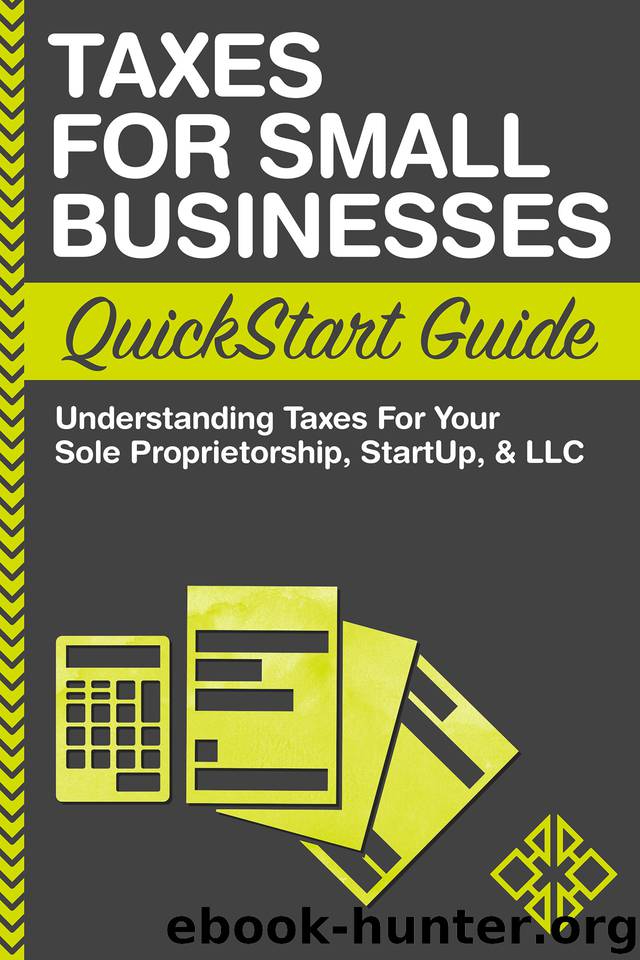Taxes for Small Businesses QuickStart Guide by ClydeBank Business

Author:ClydeBank Business
Language: eng
Format: epub
Publisher: ClydeBank Media LLC
Published: 2017-06-12T22:32:05+00:00
What if I Don’t Pay My Payroll Taxes?
Let’s assume you’ve got a small business that’s generating a considerable number of sales, but also has a lot of expenses, employees, utilities, inventory and so forth. You find that pretty much all the cash you’re taking in is going straight back out just to keep up with bare necessities of running your business. Perhaps you’ve not budgeted carefully enough for your tax liability. Or maybe some of the clients you’ve been servicing have been paying their bills late. You continue to withhold payroll taxes from your employees, but you don’t make your required deposits on time.
Payroll taxes are one area in which the repercussions from the IRS come very swiftly. They view payroll withholdings as, by all rights, their money, part of a specific trust fund that they own.
Note : The IRS considers the money withheld from employees to be theirs and temporarily held “in trust” by the employer. This is why a violation of the arrangement is met with such viciousness from the IRS. They view it as a violation of an important trust.
One thing that separates the payroll taxes your business owes from other taxes is that past due payroll taxes are viewed as a personal liability. Even if your business is set up as a limited liability company or a corporation—these entities theoretically protect the owner(s) from personal liability—the IRS can still take your car, your house, or other assets for failure to submit your payroll taxes.
There’s a dreaded penalty known as the Trust Fund Recovery Penalty (TFRP) or the “100 Percent Penalty” that’s levied against business owners or officers who fail to pay their payroll taxes. This penalty entails the obligation to pay double the amount of payroll taxes that you’d have had to pay had you paid them on time. Again, this penalty has a personal reach and can be levied against a bookkeeper, a CFO, virtually any person responsible for withholding and submitting payroll taxes. One way you can avoid this responsibility is by hiring a third party payroll service provider to run your payroll. Assuming you don’t instruct them to violate payroll withholding requirements, they are responsible for withholding and depositing the proper amounts on your behalf.
In the event you or someone in your organization is found to be responsible for not withholding or remitting payroll tax, you will receive a letter from the IRS stating their plans to levy the TFRP penalty against you.
Download
This site does not store any files on its server. We only index and link to content provided by other sites. Please contact the content providers to delete copyright contents if any and email us, we'll remove relevant links or contents immediately.
Zero to IPO: Over $1 Trillion of Actionable Advice from the World's Most Successful Entrepreneurs by Frederic Kerrest(4574)
Machine Learning at Scale with H2O by Gregory Keys | David Whiting(4313)
Never by Ken Follett(3958)
Harry Potter and the Goblet Of Fire by J.K. Rowling(3860)
Ogilvy on Advertising by David Ogilvy(3624)
Shadow of Night by Deborah Harkness(3370)
The Man Who Died Twice by Richard Osman(3081)
Book of Life by Deborah Harkness(2939)
The Tipping Point by Malcolm Gladwell(2927)
Will by Will Smith(2922)
Purple Hibiscus by Chimamanda Ngozi Adichie(2858)
0041152001443424520 .pdf by Unknown(2846)
My Brilliant Friend by Elena Ferrante(2832)
How Proust Can Change Your Life by Alain De Botton(2816)
How to Pay Zero Taxes, 2018 by Jeff A. Schnepper(2655)
Hooked: A Dark, Contemporary Romance (Never After Series) by Emily McIntire(2556)
Rationality by Steven Pinker(2367)
Can't Hurt Me: Master Your Mind and Defy the Odds - Clean Edition by David Goggins(2343)
Borders by unknow(2316)
